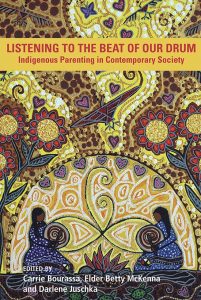By Yusur Al-Salman, Redefining Traditional Team Member
“What I want for my daughter is the complete opposite of how I was raised. It means unlearning every colonial rule in relation to parenting and families and reigniting traditions that have been torn away from us.”
– Andrea Landry, Anishnaabe from Pawgwasheeng (Pays Plat First Nation) but currently resides on Treaty Six territory in Poundmaker Cree Nation

In the spirit of decolonizing motherhood this Indigenous Education Month, we share three non-fiction and fiction books that highlight Indigenous motherhood experiences in society and in academia. Indigenous motherhood experiences are in no way homogeneous, whether within or beyond Turtle Island, and passing them down to future parents and caregivers transcends the realm of typed and printed letters, and into the realm of oral transmission, the felt and embodied experiences of relating and co-caring for human and non-human life forms, amongst other forms. Indigenous knowledge systems have persevered despite colonialisms’ effort to destroy it through residential schools and dispossession, and the resources below are but a glimpse into how indigenous mothers and caregivers are exploring pathways to motherhood and reinvigorating traditional kinship systems.
1. Listening to the Beat of Our Drum: Indigenous Parenting in Contemporary Society
Carrie Bourassa, Elder Betty McKenna, and Darlene Juschka

“Listening to the Beat of Our Drum: Indigenous Parenting in a Contemporary Society is a collection of stories, inspired by a wealth of experiences across space and time from a kokum, an auntie, two-spirit parents, a Metis mother, a Tlinglit/Anishnabe Métis mother and an allied feminist mother. This book is born out of the need to share experiences and story. Storytelling is one of the most powerful forms of passing on teachings and values that we have in our Indigenous communities. This book weaves personal stories to explore mothering practices and examines historical contexts and underpinnings that contribute to contemporary parenting practices. We share our stories with the hope that it will resonate with readers whether they are in the classroom or in the community. Like our contributors, we are from all walks of life, sharing diverse perspectives about mothering whether it be as a mother, auntie, kokum or other adopted role”. (from the publisher)
2. Daughters are Forever
Lee Maracle

“This powerful novel about a woman’s self-discovery reinforces Lee Maracle’s stature as one of the most important First Nations writers in North America. The novel incorporates an innovative structure — one based on Salish Nation storytelling — to depict the transformation of Marilyn, a First Nations woman who is alienated from her culture, her family and herself. By discovering her own culture’s ways and listening to the natural world, Marilyn begins to heal her deep-rooted hurt and gradually become reconciled with her estranged daughters. Here is a moving work about First Nations people in the modern world, and the importance of courage, truth and reconciliation”. (From Theytus Books)
3. Indigenous Motherhood in the Academy
Robin Zape-Tah-Hol-Ah Minthorn, Christine A. Nelson, and Heather J. Shotton

“This book on Indigenous Motherhood eloquently weaves together the beauty, strength, and resilience of those who transform academic spaces for the benefit of Indigenous students, families, and communities. This is the book I yearned for as a graduate student and Indigenous mother-scholar” – Jennifer Brant, University of Toronto, co-editor of ‘Forever Loved: Exposing the Hidden Crisis of Missing and Murdered Indigenous Women and Girls in Canada’
Indigenous Motherhood in the Academy “highlights the experiences and narratives emerging from Indigenous mothers in the academy who are negotiating their roles in multiple contexts. The essays in this volume contribute to the broader higher education literature and the literature on Indigenous representation in the academy, filling a longtime gap that has excluded Indigenous women scholar voices. This book covers diverse topics such as the journey to motherhood, lessons through motherhood, acknowledging ancestors and grandparents in one’s mothering, how historical trauma and violence plague the past, and balancing mothering through the healing process. More specific to Indigenous motherhood in the academy is how culture and place impacts mothering (specifically, if Indigenous mothers are not in their traditional homelands as they raise their children), how academia impacts mothering, how mothering impacts scholarship, and how to negotiate loss and other complexities between motherhood and one’s role in the academy”(from publisher).
Know of any literature or resources on Indigenous motherhood that has impacted you? Feel free to share in the comments!
0 comments on “Connecting with Indigenous Motherhood Resources”